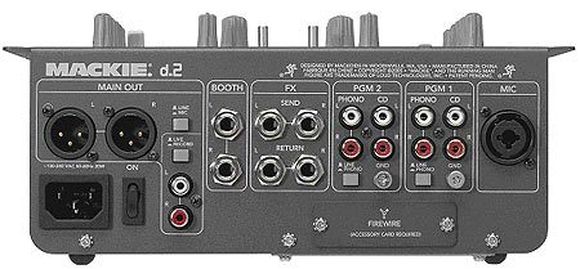3. Connections
Its very important to consider the connections available on a mixer when deciding which one to select, as this ultimately dictates what audio equipment youll be able to connect to your setup. Normally, the connection panel is split into two sections - input and output. In the output section you can expect to see at least one main output, most commonly on RCA or phono connectors, although TRS jack and XLR connections often feature on more expensive models. Some mixers have additional outputs for booth and record - these connections emit the same audio as the main outputs. The booth output has a separate volume control and is designed to be connected to the DJs main monitors in the mixing booth. The record output is fixed at line level for connection to a recording unit such as a CDR deck.

This is a good example of the output section of a DJ mixer. Each section is separated for easy identification, and this unit has a booth output and an FX loop.
The input section is normally split into sub-sections for each channel. As standard, you would expect to find a line level and a phono (record deck) level input for each channel. Some mixers will provide more inputs per channel, and sometimes the ability to switch the input level of the connections. All connections will be in stereo pairs. Depending on the features of the mixer there may also be sockets for a computer connection via FireWire, USB or MIDI, and an FX loop for connecting external effects. Last but not least is one or more ground connections, without which record decks will hum like crazy! (You can connect more than one deck to a single ground.)



